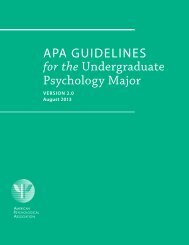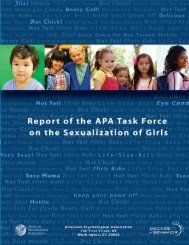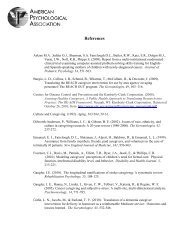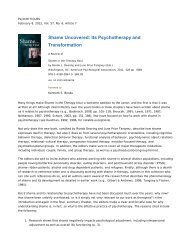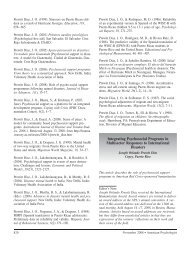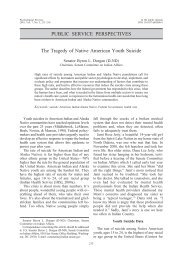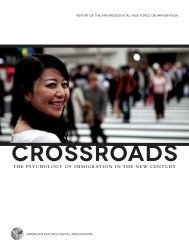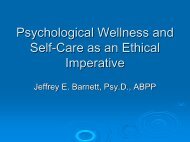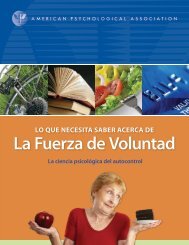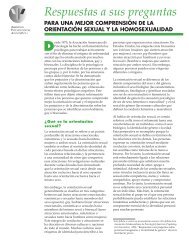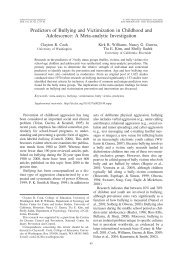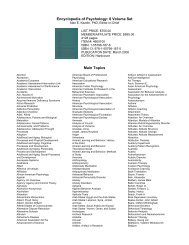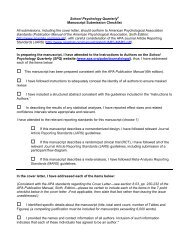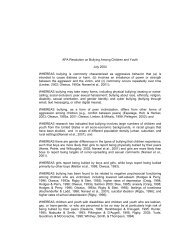James McKeen Cattell, Nicholas Murray Butler, and Academic ...
James McKeen Cattell, Nicholas Murray Butler, and Academic ...
James McKeen Cattell, Nicholas Murray Butler, and Academic ...
Create successful ePaper yourself
Turn your PDF publications into a flip-book with our unique Google optimized e-Paper software.
100 SOKAL<br />
prominent banker, so that his social status rivaled <strong>Butler</strong>’s—he complained<br />
privately to the university’s president about it. As he later reported, <strong>Butler</strong> then<br />
agreed that “no Professor would again be summoned before the Trustees” without<br />
other “representatives of the Faculty.” 134<br />
<strong>Cattell</strong>, however, responded as usual to the incident. Without realizing that the<br />
much of the trustees’ own rationale for their inquiry apparently rested on their<br />
earlier responses to his own actions, he circulated a fly leaf at Columbia headed<br />
“In Defense of <strong>Academic</strong> Freedom.” Among other things it claimed that “it is<br />
better to say to hell with the flag than to take it thither” <strong>and</strong> he asked his colleagues<br />
if “it would be in the interest of academic freedom” to publish the statement in<br />
School <strong>and</strong> Society. 135 Of the 25 responses <strong>Cattell</strong> kept, only one—from philologist<br />
E. H. Sturtivant—urged publication. All others—whether sent by <strong>Cattell</strong>’s<br />
friends (including Dewey <strong>and</strong> Thorndike <strong>and</strong> Woodbridge <strong>and</strong> Woodworth) or<br />
others—strongly advised against publication. Morgan, who had earlier rued<br />
<strong>Cattell</strong>’s response to the Loeb affair, wrote simply, “It is not likely to do any good.<br />
It is needlessly offensive. It will harm you if any body.” However, most others<br />
expressed more concern about the statement’s possible negative impact on academic<br />
freedom at Columbia. Even those (like Seligman) who feared the implications<br />
of the trustees’ actions argued that “much harm might ensue” from<br />
publication. Others wrote that <strong>Cattell</strong>’s note would “make a joke of the subject of<br />
academic freedom” (from George P. Krapp) <strong>and</strong> would “set back the cause of<br />
academic freedom about a generation” (from William A. Dunning). 136 <strong>Cattell</strong> took<br />
his colleagues’ advice <strong>and</strong> did not publish the statement. Nevertheless, he again<br />
did not seem to notice their larger concerns. In particular, they feared the<br />
precedent that would follow if <strong>Cattell</strong>’s continued harassment led to his arbitrary<br />
dismissal from the university, so they warned him explicitly of their worries.<br />
However, he continued to ignore these warnings, <strong>and</strong> continued acting as he had<br />
for years, <strong>and</strong> in the months that followed his relations with his Columbia<br />
colleagues grew still worse.<br />
The next incident that colored the trustees’ sense of <strong>Cattell</strong> was unrelated to<br />
his antimilitarist views. In January 1917, when <strong>Butler</strong> announced plans to close<br />
Columbia’s faculty club, <strong>Cattell</strong> attacked the president in a fly leaf “Confidential<br />
Memor<strong>and</strong>um” that referred to him as “many talented <strong>and</strong> much climbing”—<br />
views that many had shared privately—<strong>and</strong> jokingly urged the club to take over<br />
<strong>Butler</strong>’s own house. 137 Little came of this remark until March, when several<br />
newspapers published it, 138 <strong>and</strong> Seligman—who hoped to save academic freedom<br />
at Columbia from <strong>Cattell</strong>—called some 20 of his colleagues into “hurried consultation.”<br />
139 They all signed a statement explicitly disassociating themselves<br />
from <strong>Cattell</strong>’s comment. However, they primarily sought to prevent the incident<br />
from escalating further <strong>and</strong> from leading to any precedent (such as <strong>Cattell</strong>’s<br />
arbitrary dismissal) that would further erode their academic freedom. Seligman<br />
<strong>and</strong> two others met with <strong>Butler</strong>, specifically to prevent any “summary action”<br />
against <strong>Cattell</strong>. <strong>Butler</strong> “intimated [to them] that he thought that Professor <strong>Cattell</strong>’s<br />
usefulness to the University had come to an end.” However, he agreed to refer any<br />
trustee response to the matter to a committee that included faculty members.<br />
Two days later, the Columbia trustees seriously discussed resolutions that<br />
<strong>Cattell</strong> be suspended, dismissed, or given a chance to resign, <strong>and</strong> called him to<br />
appear before them. 140 <strong>Cattell</strong> then sought Dewey’s <strong>and</strong> Seligman’s advice <strong>and</strong>



